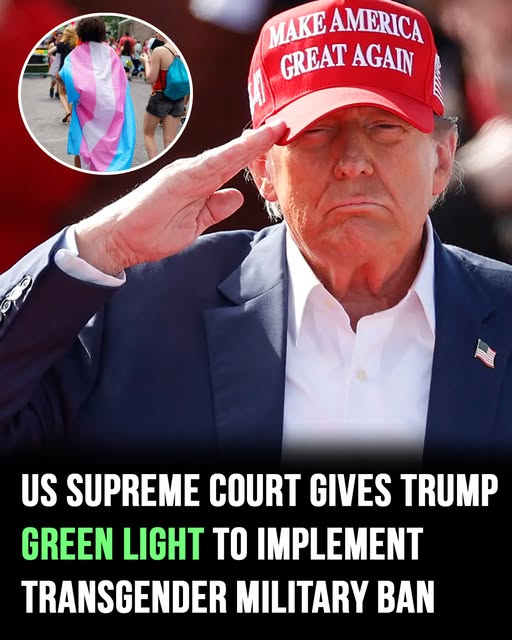
Supreme Court Backs Trump’s Transgender Military Ban Amid Ongoing Legal Battle
In a move that’s ignited national debate, former President Donald Trump has followed through on another campaign promise: banning transgender individuals from serving in the U.S. military.
Despite strong opposition and legal challenges, the Supreme Court ruled on May 6, 2025, that the administration can proceed with the policy—even as lawsuits continue in lower courts.
The ban stems from an executive order Trump signed just one week into his presidency, titled “Prioritizing Military Excellence and Readiness.” The directive bars transgender individuals from enlisting and mandates the removal of current service members who identify as transgender.
Two major LGBTQ advocacy groups—LGBTQ Legal Advocates & Defenders and the National Center for Lesbian Rights—swiftly challenged the order in court. In March, U.S. District Judge Ana Reyes of Washington, D.C., temporarily blocked the policy. But that decision was effectively overridden by the Supreme Court’s recent ruling.
Supporters of the order argue that allowing transgender individuals to serve “dilutes military excellence” and introduces “political agendas” into military culture. The policy states that identifying with a gender different from one’s assigned sex is “inconsistent with a soldier’s commitment to an honorable, truthful, and disciplined lifestyle.”
The lawsuit, brought on behalf of six active-duty transgender service members and two individuals hoping to enlist, contends that the ban is rooted in discrimination. It claims the policy is driven by “animosity toward transgender people because of their transgender status.”
As this controversial measure begins to take effect, it raises serious questions about inclusion, military policy, and the future of transgender rights in America.

Backlash Grows After Supreme Court Allows Trump’s Trans Military Ban to Proceed
When U.S. District Judge Ana Reyes temporarily blocked former President Donald Trump’s military ban in March, she made a firm case against the policy’s constitutionality. Reyes argued the executive order violated the Equal Protection Clause by discriminating on the basis of both transgender status and sex.
In her ruling, she described the language of the order as “unabashedly demeaning,” asserting that it “stigmatizes transgender persons as inherently unfit” for service. The judge further criticized the policy’s rationale, saying its conclusions “bear no relation to fact.”
She emphasized that the government had the opportunity to craft a policy that respected both national security and constitutional rights, writing, “The Military Ban, however, is not that policy. The Court therefore must act to uphold the equal protection rights that the military defends every day.”
Despite her ruling, the Supreme Court has since allowed the Trump administration’s ban to take effect. The unsigned decision, issued earlier this week, came without a full opinion, though the Court’s three liberal justices noted their dissent.
The decision has sparked sharp condemnation from civil rights groups across the country.
In a joint statement, Lambda Legal and the Human Rights Campaign Foundation denounced the Court’s move:
“By allowing this discriminatory ban to take effect while our challenge continues, the Court has temporarily sanctioned a policy that has nothing to do with military readiness and everything to do with prejudice.”
They added, “Transgender individuals meet the same standards and demonstrate the same values as all who serve. We remain steadfast in our belief that this ban violates constitutional guarantees of equal protection and will ultimately be struck down.”
As the policy goes into effect, the debate over fairness, military readiness, and human rights continues to intensify—raising profound questions about whose rights are truly being defended under the banner of national service.